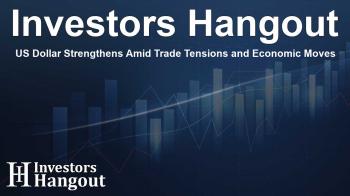US Dollar Strengthens Amid Trade Tensions and Economic Moves

US Dollar Gains as Tariff Discussions Intensify
The landscape of the financial markets is shifting as developments around tariffs gain traction. Following the approval of the US Budget Bill, focus has turned to trade tariffs, a prominent topic for many in the business sector. This ongoing situation has led to a significant strengthening of the US dollar, while other asset classes are reacting diversely.
Tariff Letters and Their Impact on Market Sentiment
In recent communications, US President Trump placed emphasis on tariffs, extending a previously set deadline for negotiations. Several countries, most notably Japan and South Korea, have received letters detailing proposed tariffs. These could reach up to 48% if they do not comply with the demands by the next deadline. Interestingly, both the EU and India have not been subjected to these letters, indicating ongoing negotiations that could ease tensions.
Market Reaction: Shifting to a Risk-Off Stance
The financial markets have quickly adjusted to these news updates, adopting a risk-off approach. This has caused the US dollar to rally against both the euro and the yen. The change in market sentiment is striking compared to previous months, as uncertainty lingers over what these tariff discussions could mean long-term.
Equities Falter as Gold Shines
Equities are showing signs of weakness amid this backdrop, while gold has seen renewed interest. In particular, gold prices have seen a jump, reflecting investor demand despite the strength of the dollar. This duality between gold and equities mirrors broader concerns about economic stability and investor sentiment.
Focus on Future Trade Negotiations
Market participants are likely to remain vigilant for any updates on which nations may next receive tariff letters, as well as progress regarding US-EU trade relations. Given Trump's negotiation style, the potential for fluctuations in these relationships remains high, upending established trading patterns.
Potential Implications for Economic Policy
Our eyes are also likely to turn towards the Federal Reserve as discussions on monetary policy continue. Former Fed Governor Warsh is among the candidates to lead the Fed, suggesting a shift towards a more modern approach in managing economic conditions. The credibility of the Federal Reserve is paramount, particularly during volatile periods influenced by global trade dynamics.
Australian Dollar Expresses Mixed Signals
In the context of these global developments, the Australian dollar is also witnessing fluctuations. The Reserve Bank of Australia (RBA) made the decision to maintain current interest rates, reflecting a cautious approach while awaiting more data on economic conditions, particularly given Australia’s absence from recent tariff letters.
Economic Indicators and Market Speculation
As Australia eyes its upcoming Consumer Price Index (CPI) report, the RBA's decision makes sense amidst evolving trade relations. The Aussie did experience a boost recently, correlated to a rally from the US dollar; however, the longer-term outlook remains cautious as market conditions fluctuate.
What Lies Ahead for Traders and Investors?
Looking ahead, traders should be mindful of upcoming economic data releases and updates from central banks. The interplay between currency strength, trade developments, and market sentiment will continue to shape investment strategies in the near future.
Frequently Asked Questions
How do tariffs affect currency values?
Tariffs can lead to a stronger currency as they may enhance demand for that currency amid economic uncertainty. Investors tend to flock to perceived safety, boosting the value of that currency.
What is the outlook for gold prices given current economic conditions?
The outlook for gold remains positive as it is often viewed as a hedge against inflation and economic instability, attracting investor interest during turbulent times.
What impact does the Federal Reserve have on the US dollar?
The Federal Reserve influences the dollar significantly through interest rate decisions and monetary policy. Market participants closely monitor these developments for potential impacts.
What are the implications of Australia not receiving a tariff letter?
Australia’s exclusion from tariff discussions may provide temporary stability, but it also leads to uncertainty about future trade negotiations that could surface later on.
How should investors prepare for future market volatility?
Investors should stay informed on economic indicators and central bank policies while diversifying their portfolios to mitigate risks associated with sudden market changes.
About The Author
Contact Dylan Bailey privately here. Or send an email with ATTN: Dylan Bailey as the subject to contact@investorshangout.com.
About Investors Hangout
Investors Hangout is a leading online stock forum for financial discussion and learning, offering a wide range of free tools and resources. It draws in traders of all levels, who exchange market knowledge, investigate trading tactics, and keep an eye on industry developments in real time. Featuring financial articles, stock message boards, quotes, charts, company profiles, and live news updates. Through cooperative learning and a wealth of informational resources, it helps users from novices creating their first portfolios to experts honing their techniques. Join Investors Hangout today: https://investorshangout.com/
The content of this article is based on factual, publicly available information and does not represent legal, financial, or investment advice. Investors Hangout does not offer financial advice, and the author is not a licensed financial advisor. Consult a qualified advisor before making any financial or investment decisions based on this article. This article should not be considered advice to purchase, sell, or hold any securities or other investments. If any of the material provided here is inaccurate, please contact us for corrections.

